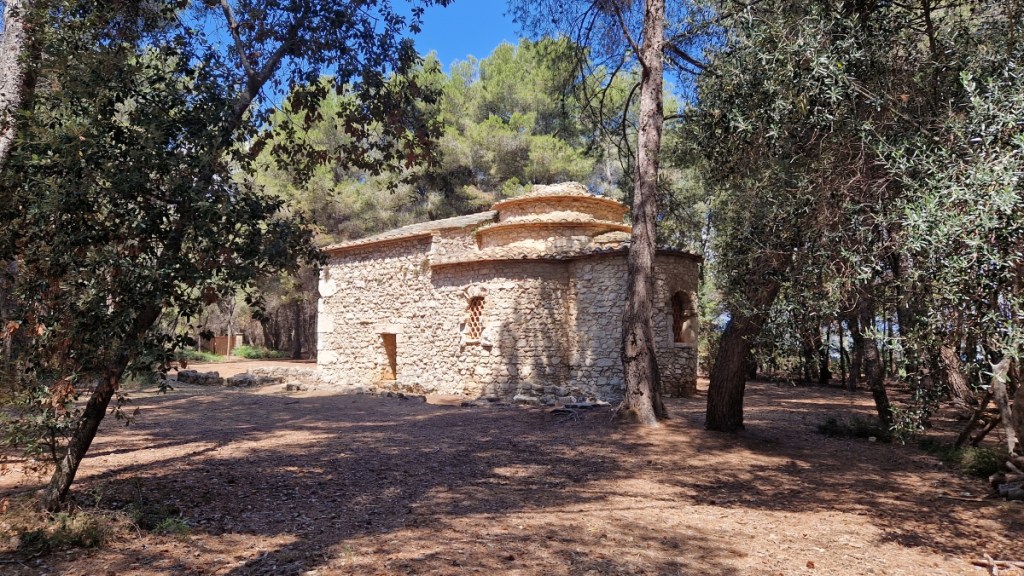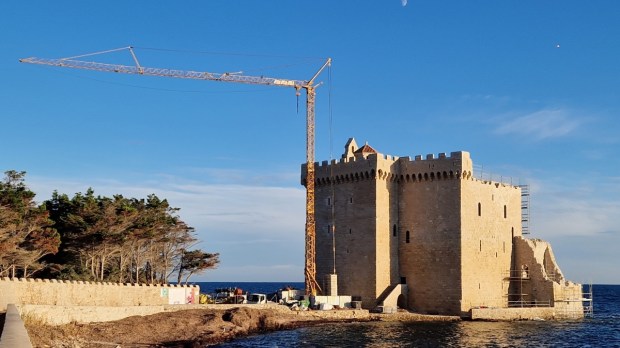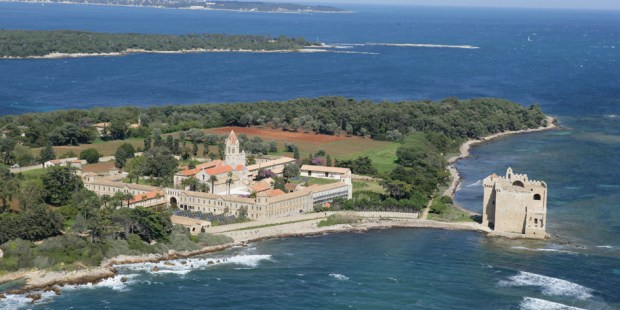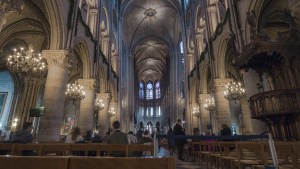Restoring historic Catholic churches may be challenging but it is a vital endeavor. It provides historic continuity, while also helping to preserve the Catholic faith. France’s President Emmanuel Macron recently announced a major campaign to restore and protect religious buildings. The four-year plan he promised is good news for France as many Catholic cathedrals, monasteries, convents, and abbeys are devasted, in bad shape and badly in need of restoration.
The Abbey of Lérins sits on Île Saint-Honorat (the Island of Saint Honoratus), just off the coast of Cannes. It is a fine example of the dedication to preserve our Catholic cultural heritage. Restoration work on the fortified monastery tower is underway and should be completed by the end of the summer.
Renovation of a historic monument
Île Saint-Honorat was uninhabited until 410, when Saint Honoratus established a monastery there, turning it into a sacred island, a place of refuge, pilgrimages, and burial.
Over the years, restoration efforts have focused on the renovation of the tower, a stunning edifice standing stoically and majestically on the southern tip of the island.
Construction of this unique refuge tower began in 1073 and continued into the 15th century. It was built military style; this was a safe place for the monks whenever pirates and other invaders attacked the island. After the monks moved in, they converted the tower into a monastery tower, adding modifications such as two cloisters, one below the other. This was their abode until 1788 when the abbey was decommissioned just before the French Revolution.
Built in three stages and over three centuries, this stunning landmark comprised three floors. The tower, which is built on a rock, faces the open sea directly. Understandably, the structure has weakened over the centuries, not so much from the sea water but primarily by rain as Iva Zunjic, project manager for the Cultural Heritage Department, explained. When it rains, she said, water seeps through the joints of the ashlar stone walls, thus weakening the structure.
Architects and construction workers started restoration work in July 2020 and are now concentrating on building two roofs to protect the monument more substantially from rainwater.
As Zunjic pointed out, the project for renovating the tower had two main objectives — first, to protect against climatic impacts and secondly to secure the building, making it accessible for visitors. She said:
The present tower has three levels and a roof platform with an astonishing view. Over time, it lost two levels and one part of the west wing, which collapsed at the end of the 19th century.
A costly endeavour
Initially estimated at 5 million euros, costs have now reached 7 million euros. Zunjic explained that the cost of building materials, especially metal, has increased considerably. The pandemic and the Ukraine conflict also disrupted the supplies, causing delays in the tower’s reopening.
As the Monastary Tower of Lérins Abbey is classed as a historic building, it is entitled to substantial funding from the French State. The State and Ministry of Culture have donated 45% of the costs so far. Other donations have come from the Department of Alpes-Maritimes (37%), the city of Cannes, the Heritage Foundation, and individual contributors.

The island with seven Chapels
There are seven chapels in total on Île Saint-Honorat. The two most outstanding are Trinity Chapel and the chapel of Saint Sauveur, both recognized as historical monuments. Trinity Chapel, set among pine trees on the island’s eastern end, is now a fully restored. Saint Sauveur Chapel is an 11th-century octagonal-shaped building erected on the site of older buildings. Excavations carried out between 2008 and 2012 revealed it to be an exceptional archaeological site.
A living legacy of faith
Saint-Honorat is home to a congregation of 21 Cistercian monks who live here peacefully, continuing to observe the rules of Saint Benedict in their prayer and work. They cultivate award-winning organic wine on 8 hectares of vineyard. The terroir is unique on Saint Honorat, with sunshine most of the year. The red and white wines are sought-after vintages. The monks also make quality liqueurs and olive oil.
Visitors come to the island seeking peace; it is open to everyone, perfect for meditation and for spiritual retreats.
The resident monks are conscious of their legacy. They say:
This heritage that time passes, the wind and the sea wear away, we have the duty and the mission to maintain it, to pass it on to make it even more accessible, understandable and objects of experience for all the people who come to the island.




